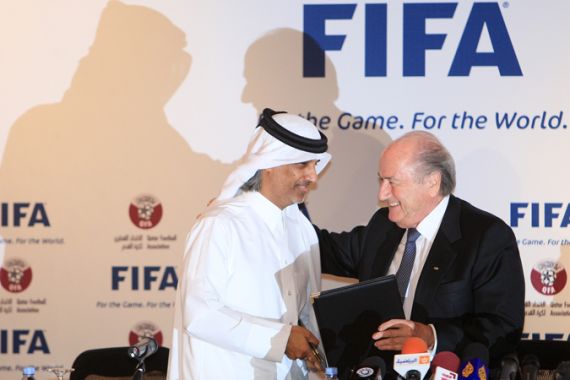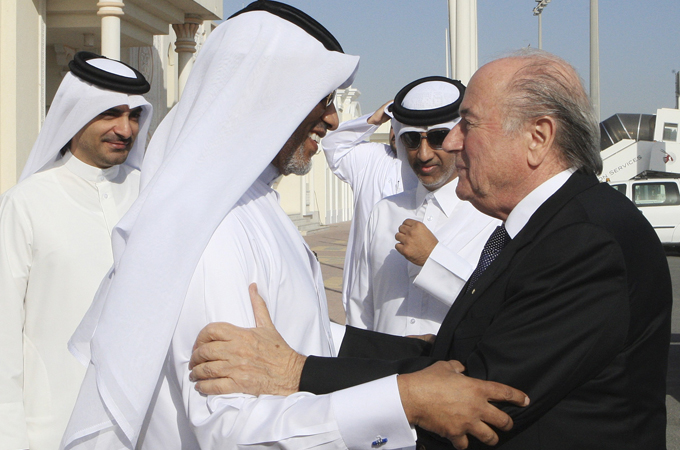FIFA ‘backs’ winter 2022 Qatar cup
Sepp Blatter says football governing body supports idea of winter World Cup and Gulf co-hosts, if Qatar is interested.

 |
| FIFA’s president has said Qatar, along with the world football body, will work out details of 2022 World Cup [Reuters] |
The president of FIFA says he would be open to the idea of holding the 2022 World Cup during the winter to avoid the brutal summer heat of host nation Qatar.
Sepp Blatter made the comment on Friday, as part of an announcement aimed at reassuring the football world about FIFA’s December 2 decision to hold the world’s biggest sporting event in the Gulf Arab nation.
Keep reading
list of 4 itemsHolders Man City go out of Champions League on penalties to Real Madrid
Barca crash out as Mbappe brace leads PSG to Champions League last four
Saudi reviews football fan rules after whip attack
Blatter also used the occasion to apologise for previous remarks, in which he said gay fans should “refrain from sexual activity” while at the 2022 cup in Qatar.
Gay rights activists have been calling for the FIFA chief to resign or issue an apology since he made the comments earlier this week.
Football’s world governing body has come under criticism for selecting Qatar to host the event, with concerns raised ranging from the acceptance of homosexual fans to the country’s searing summer temperatures.
Searing summer heat
On the issue of climate, Blatter said he would be happy for the cup to be played during the colder winter and not in the humid summer heat, which can reach 50 degrees Celsius in Qatar.
“I definitely support to play in winter here [in the Middle East],” Blatter told a news conference at the Club World Cup in Abu Dhabi on Friday.
“To play when the climate is appropriate, and I’m thinking about the footballers, not only the fans but the actors. Personally I think it would be better that it is played in the winter … but it’s not easy to realise.”
Since Qatar was awarded the staging of the 2022 finals, there have been suggestions from leading figures like Franz Beckenbauer that the FIFA calendar should be altered for that year.
The change would have major implications for domestic competitions in Britain and the rest of Europe, where the league programmes would be in full swing.
“The basic principle signed is about 64 matches in Qatar in the months of June and July, that’s what we have at the moment,” Blatter said, one day after attending a ceremony in Qatar marking the country’s successful bid.
“It’s a question of the international calendar, but … it’s in 11 and half years till this can be done,” Blatter said.
Qatar’s Gulf co-hosts
The FIFA president also announced that there are ongoing discussions about holding some matches in other Gulf states besides the host nation.
Blatter said that Qatar remains the final arbiter about whether the United Arab Emirates and others will play host to some of the games.
Although several Gulf countries are interested in hosting games during the 2022 World Cup, he said on Friday that the decision on expanding the tournament beyond Qatar must come from the desert nation – and then be considered by FIFA’s 24-member executive committee.
Blatter, who met with football officials in Oman, Bahrain and Kuwait, as well as Qatar, during a tour of the region this week, said “the item was on the agenda” when he met with Qatari officials but refused to say whether they support it.
“I can say all these countries are very happy first of all the World Cup is going to the Middle East … and they are interested, I would say a little bit more than interested, to be part of this competition.”
Blatter did not elaborate on which countries would want to host the games nor how many games could be hosted by Qatar’s neighbours.
Since winning the bid, Qatar has not commented on whether it would be open to having games hosted in neighbouring countries.
In an interview with sports daily L’Equipe earlier this month, Blatter said Australia’s 2022 World Cup bid proposed some matches could be held in New Zealand, and Qatar could likewise have neighbouring countries host games.
In its bid proposal, Qatar played up the fact that it could host a “compact World Cup” where all the matches would be within an hour of one another.
It has never suggested that games could be held in other countries, rather that future transport links would make it easy for fans coming from Bahrain, the United Arab Emirates or even Saudi Arabia to reach matches in the country.
Even with Blatter’s endorsement, a Gulf World Cup may face hurdles due to traditional rivalries that have stymied economic co-operation among the six Gulf Arab countries in the past.